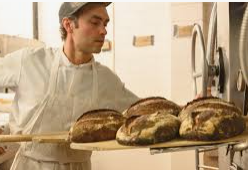IELTS Vocabulary Work/Job - Từ vựng IELTS chủ đề Công việc
WWork/Job là chủ đề thường gặp trong các phần thuộc đề thi IELTS. Chính vì vậy, bổ sung thêm vốn từ vựng cho chủ đề này là điều các bạn không thể bỏ qua phải không nào! hãy học ngay những từ vựng tốt trong chủ đề này để giúp bạn chinh phục điểm IELTS thật cao nhé!
IELTS Vocabulary Work/Job
Trước khi đến với từ vựng, chúng ta cùng luyện tập để thêm kiến thức nhé. Việc tìm hiểu từ vựng thông qua các hoạt động luyện tập trước sẽ giúp bạn nhớ lâu hơn.
Luyện tập 1
Write the correct word in the boxes below the picture.
|
|
Baker |
Teacher |
Dentist |
Singer |
|
|
Painter |
Doctor |
Farmer |
Waiter |
|
|
|
|
|
|
|
|
|
|
|
|
|
…………………………… |
……………………… |
…………… |
…………………………… |
|
|
|
|
|
|
|
|
…………………………… |
…………………………… |
…………………………… |
…………………………… |
|
|
Word |
Form |
Phonetics |
Meaning |
|
Baker |
N |
/ˈbeɪkər/ |
Thợ làm bánh |
|
Teacher |
N |
/ˈtiːtʃər/ |
Giáo viên |
|
Dentist |
N |
/ˈdentɪst/ |
Nha sĩ |
|
Farmer |
N |
/ˈfɑːrmər/ |
Nông dân |
|
Singer |
N |
ˈsɪŋər/ |
Ca sĩ |
|
Doctor |
N |
/ˈdɑːktər/ |
Bác sĩ |
|
Waiter |
N |
/ˈweɪtər/ |
Nhân viên phục vụ |
|
Painter |
N |
/ˈpeɪntər/ |
Họa sĩ |
Luyện tập 2
Listen and fill in the blank (Track 1)
The study that I looked at had investigated the relationship between differences in gender and differences in working hours, and levels of job satisfaction amongst (1) ……………………. For this purpose, employees at a call centre had been asked to complete a questionnaire about their work.
I’ll summarise the findings of that study briefly now. First of all, female full-time workers reported slightly higher levels of job satisfaction than male full-time workers. Secondly, female part-time workers reported slightly higher levels of satisfaction than female full¬time ones did. On the other hand, male part-time workers (2) ………………………. slightly less job satisfaction than male full-time workers. But although these (3) …………………….. seemed interesting, and capable of being explained, perhaps the most important thing to mention here is that in statistical terms they were inconclusive.
Personally, I was surprised that the (4) …………………….. hadn’t been more definite, because I would have expected to find that men and women as well as full and part-time workers would experience different levels of satisfaction. So I then looked more carefully at the methodology employed by the researchers, to see where there may have been (5) ……………………... This is what I found.
|
Word |
Form |
Phonetics |
Meaning |
|
Working hour |
N |
/ˈwɜːrkɪŋ/ /ˈaʊər/ |
Thời gian làm việc |
|
Job satisfaction |
N |
/dʒɑːb/ |
Sự hài lòng trong công việc |
|
Employ |
V |
/ɪmˈplɔɪ/ |
Tuyển dụng |
|
Employment |
N |
/ɪmˈplɔɪmənt/ |
Sự tuyển dụng |
|
Employer |
N |
/ɪmˈplɔɪər/ |
Nhà tuyển dụng |
|
Employee |
N |
/ɪmˈplɔɪiː/ |
Nhân viên |
|
Experience |
N,V |
/ɪkˈspɪriəns/ |
Trải qua, trải nghiệm |
Practice exercises
Exercise 1. Crossword
|
Across |
Down |
|
1. a person who is paid to work for somebody 6. knowledge and skill that you have gained through doing something for a period of time |
2. a person or company that pays people to work for them 3. a person whose job is painting buildings, walls 4. a person whose job is to serve customers at their tables in a restaurant, etc. 5. a person whose job is baking and selling bread and cakes |
Exercise 2. Read the paragraph and choose True or False
MY WORK EXPERIENCE
My name is Pepe. I was born in Puebla, Mexico in 1990. I had my first job when I was 18 years old. I was a carpenter. The job was interesting, but my salary wasn't good. I had that job for 5 years. I arrived in the United States in 2013. My first job here was a dishwasher in a Chinese restaurant. After a year, I started to work as a busboy. That was a fun job. In 2015, I got another job in an Italian restaurant. I was a server there for two years. But I really like to cook and I asked my boss to give me a job in the kitchen. He did and I quickly learned to make great pizza and delicious pasta. So first I was a cook and now I am the assistant chef. It's really great. I love my job.
|
Sentences |
True |
False |
|
1. Pepe was born in Mexico. |
|
|
|
2. He was a mechanic in his country. |
|
|
|
3. He came to the United States in 2010. |
|
|
|
4. His first job in the US was a cook. |
|
|
|
5. Now he is an assistant chef. |
|
|
|
6. He really likes his job very much. |
|
|
Exercise 3. Choose and fill the words and phrases in their meaning
|
Thank to |
Catch up on |
Take on |
Lay off |
Work with |
|
Step in |
Take over |
Be in touch |
Involve in |
Interested in |
|
1. Take part in something. |
……………………… |
|
2. To be intrigued by or curious about something. |
……………………… |
|
3. To communicate with someone. |
……………………… |
|
4. To become involved in a difficult situation or argument in order to help find a solution. |
……………………… |
|
5. To accept; to take control of something. |
……………………… |
|
6. To have a job, usually one that you are paid to do. |
……………………… |
|
7. Used for saying that someone or something is responsible for something good that happened. |
……………………… |
|
8. To accept new employees; to hire. |
……………………… |
|
9. To dismiss employees from their jobs. |
……………………… |
|
10. To go faster, or to make something go faster. |
……………………… |
Exercise 4. A student is writing a thank-you letter for his tutor for helping him prepare for the presentation. Complete the letter by making sentences using the given words and phrases.
1. I’m / just/ write/ say thanks / your help / the presentation last week.
2. Thank you / so much for / step / in to help.
3. I know / you / had to put / extra hours to catch / on your own work.
4. We hope / work / you again / future projects.
5. I’ll be / touch / again soon.
6. I look / forward / work / with you more closely.
Exam focus
Exercise 1.
Listen and fill in the blank with the correct form of the phrasal verb. (Track 2)
|
pick up call him back put him off wash up get through take him on call by carry on |
Sam is trying to call the café but he can’t (1) …………………………… (be connected on the phone). A few minutes later, the café owner (2) …………………………… (calls him after he called her). If Sam does well during his day’s trial, she will (3) …………………………… (employ him) for the summer. Sam is making food and (4) …………………………… (washing dirty plates etc.) when Jasmine asks him for help because business is (5) …………………………… (increasing, improving). Sam is already stressed and doesn’t think he can (6) …………………………… (continue). He thanks his friends for (7) …………………………… (visiting for a short time) but tells them they are (8) …………………………… (distracting him).
2. Listen again and match A and B to complete the sentences
|
A |
B |
|
1. Fred thinks Sam’s idea of working in the summer is |
a. for one day as a trial, to decide if he can have the job all summer. |
|
2. The café owner calls Sam. They agree he will work |
b. the café is getting busy. |
|
3. Sam’s job is to |
c. they are distracting him from his work. |
|
4. Jasmine asks Sam to help her because |
d. not a good way to spend your holidays. |
|
5. Sam is not happy when he sees his friends because |
e. make food, wash dirty dishes and help Jasmine. |
Exercise 2. Listen and do the following tasks. (Track 3)
1. Decide if each sentence is TRUE or FALSE
|
Sentence |
True |
False |
|
1. The Pomodoro Technique was invented in the 1980s. |
|
|
|
2. Students and workers can use the technique. |
|
|
|
3. The technique is a bit complicated to use. |
|
|
|
4. You need to break down your tasks into smaller sections. |
|
|
|
5. Each break is called a ‘pomodoro’. |
|
|
|
6. Peter uses an app on his mobile to time himself. |
|
|
|
7. After four or five short breaks you can have a longer break. |
|
|
|
8. Peter takes less time to do his homework these days. |
|
|
3. Fill in the gaps with the correct word from the box
|
productivity five list item timer time task breaks |
The Pomodoro Technique is designed to help people work effectively and avoid wasting (1) ………………... It helps you to get the maximum (2) ………………... in the time you have. First you have to break down each (3) ………………... into steps. Then you use a (4) ………………... to organise your time into intensive work and (5) ……………….... You write a list of things you need to do, set the timer to twenty-five minutes and start working on the first (6) ………………... on your list. When the timer goes off you stop work for (7) ………………... minutes. Then you repeat these steps four or five times, ticking items off your (8) ………………... as you finish them. After a few short breaks you can take a longer break.
Exercise 3. Match column A to column B to make full sentences then practice speaking
|
Question |
A |
B |
|
What do you do? |
1. For the past few months, I’ve been working for The Guardian as a news editor. |
a. To be more specific, this job is unlike the nine-to-five work schedule, enabling me to find a better balance between work and life. Besides, this job gives me opportunities to pursue my dream to become a journalist. |
|
Why did you choose to do that type of work (or, that job)? |
2. I guess it’s mainly because of job flexibility & my passion for journalism. |
b. This is my first job ever, and I’m working hard to contribute to the success of this prestigious newspaper |
|
Do you enjoy your work? |
3. I do, most of the time. |
c. Contributing to the news production for a world-class newspaper gives me a sense of satisfaction and pride. |
|
What do you like/dislike about your job? |
4. Well, the perk of being a news editor is that you’ll surround yourself with exciting news daily. |
d. The academic environment was a comfort zone, and I struggled to fit in the working environment. |
|
Do you miss being a student? |
5. I missed student life once I got involved in the workplace. I think when I was a student, I had someone to guide me, whereas at work you must guide yourself. |
e. What I don’t like about this job is that I have to do a thousand edits to get to the final one that meets the requirement of my boss. Sometimes I feel a bit overloaded with tons of tasks. |
1…………….. 2. …………….. 3. ……………..
2…………….. 5. ……………..
Exercise 4. Listen and fill in the blank (Track 4)
Work experience
I wanted to spend a little bit of time today talking about the importance of work experience as you're considering different management programmes. Now this will vary a lot school by school. So some (1) ……….…………. actually will have a minimum number of years of required work (2) ……….…………. so you should enquire with all the schools that you are (3) ……….…………. in, sort of, what their recommendations are.
At Stanford specifically, we don't necessarily look at a certain number of years of (4) ……….…………. experience, but what we’re really looking for are your leadership examples that you’re able to draw from in your life. And as a result, some people actually come to us a little bit earlier on in their (5) ……….………….
So, most years we might even have, you know, one or two students who come directly after university, but they’ve got incredibly strong leadership examples to draw from: maybe it is from being involved in student government, or clubs, or organizations, or starting a non-profit organization, or having been involved (6) ……….…………. a family business growing up. So they’re able to draw and refer to those leadership experiences in the classroom.
Listen again and fill the gaps in the sentences below:
1. Some schools have a ……………………. number of years of required work experience.
2. Stanford applicants should demonstrate examples of ……………………….
3. Some students can ……………..……. from their experiences in student politics, clubs, a non-……………………. organization or a ………….………. business.
Từ vựng Work cho Speaking
|
No. |
VOCABULARY |
DEFINITION |
|
1 |
to be called for an interview |
Được gọi tới phỏng vấn |
|
2 |
to be your own boss |
Có công việc kinh doanh riêng |
|
3 |
a dead-end job |
Một công việc không có cơ hội thăng tiến |
|
4 |
to do a job-share |
Chia sẻ giờ làm việc hàng tuần với người khác |
|
5 |
a good team player |
Người hợp tác tốt với người khác trong công việc |
|
6 |
full-time |
Số lượng giờ nhất định trong tuần mà một người phải làm |
|
7 |
a heavy workload |
Khối lượng công việc lớn |
|
8 |
a high-powered job |
Một công việc quan trọng |
|
9 |
holiday entitlement |
Số ngày nghỉ phép |
|
10 |
job satisfaction |
Sự hài lòng đối với công việc |
|
11 |
manual work |
Công việc tay chân |
|
12 |
maternity leave |
Nghỉ thai sản |
|
13 |
to meet a deadline |
Hoàn thành công việc đúng hạn |
|
14 |
a nine-to-five job |
Một công việc làm 8 tiếng/ngày |
|
15 |
one of the perks of the job |
Những giá trị khác từ công việc |
|
16 |
part-time |
Công việc bán thời gian |
|
17 |
to run your own business |
Có công việc kinh doanh riêng |
|
18 |
to be self-employed |
Có công việc kinh doanh riêng/Tự mình làm chủ |
|
19 |
sick leave |
Nghỉ ốm đau |
|
20 |
to be stuck behind a desk |
Mắc kẹt trong công việc bàn giấy buồn chán |
|
21 |
to be/get stuck in a rut |
Mắc kẹt trong một công việc nhàm chán nhưng lại rất khó bỏ |
|
22 |
to take early retirement |
Nghỉ hưu non |
|
23 |
temporary work |
Công việc tạm thời |
|
24 |
voluntary work |
Công việc tình nguyện |
|
25 |
to be well paid |
Được trả lương hậu hĩnh |
|
26 |
working conditions |
Các điều kiện làm việc (thời gian, lương, các quyền khác của người lao động) |
|
27 |
to work with your hands |
Công việc tay chân |
Áp dụng các với từ vựng ở trên chúng ta sẽ đưa vào mẫu câu trả lời IELTS speaking trong part 1, part 2 và part 3 nhé! Bạn hãy lưu ý tới những từ in đậm để hiểu rằng các từ vựng đã được sử dụng như thế nào sao cho hợp lý nhất nhé!
Part 1-style questions
Examiner: What do you do?
Sasha: I do a job-share with a friend in a boutique … I enjoy it … I like working with customers … unfortunately it’s only temporary work but one of the perks of the job is I get a discount on the clothes …
Examiner: Do you have any career plans yet?
Carly: Yes … I’d like to be my own boss one day … I’m interested in programming and I’d like to create apps for myself or for other companies … I know being self employed would be a challenge but the idea of doing a nine-to-five job doesn’t appeal to me at all …
Examiner: What do you see yourself doing in 10 years time?
Marie: I’d hope to be working … not a high-powered job … but I’m quite a creative person so something where I can work with my hands would be nice … as long as I’m not stuck behind a desk doing something boring in a dead-end job I’ll be happy …
Part 2-style task
Describe your ideal job. You should say:
- what this job is
- whether you would need any qualifications
- whether it would be easy to find work
and say why you would enjoy this job in particular.
Max: I’ve always loved watching wildlife programmes on TV and often thought how much I’d enjoy working with animals … perhaps in a safari park … something like that … you’d probably need a degree to have any chance of being called for an interview and whether there are manyfull-time jobs I don’t know … I’m sure a lot of parks rely on voluntary work so it might not be easy … and it probably wouldn’t be well-paid either but money isn’t everything … I’d get so muchjob satisfaction … I can’t imagine it being the kind of job where you get stuck in a rut … and I think I’d be good at it as well … I’d love to work with animals I enjoy manual work and I’m a good team player … so even though the working conditions might not be the best I think that would be my ideal job …
Part 3-style questions
Examiner: If there are a limited number of jobs available who should be given priority, young people or older people with more experience?
Anna: Things are so different these days … a few years ago older employees would often take early retirement or go onto part-time contracts and there were always opportunities for younger people but now jobs are so scarce … I think younger people need to be given the chance whenever possible …
Examiner: What are some of the important things a candidate should find out before accepting a job?
Ali: Well … you’d need to know about your area of responsibility … and your salary of course and then there are things like holiday entitlement … maternity or paternity leave … if you’re thinking of having children … and what the situation is regarding sick leave … that kind of thing …
Examiner: What are the advantages of having your own business rather than working for someone else?
Julie: Well … unfortunately being an employee at the moment is very stressful … people have veryheavy workloads … they’re always under pressure to meet deadlines … running your own business isn’t easy … but I do think it would be far more satisfying …
Nguồn bài mẫu: ieltsspeaking.co.uk
ĐÁP ÁN
Luyện tập 2:
Do this exercise while you listen. Circle the best answer for these questions. (Track 1)
1. workers
2. experienced
3. results
4. findings
5. problems
Practice exercise
Exercise 1. Crossword
1. employee
2. employer
3. painter
4. waiter
5. baker
6. experience
Exercise 2. Read the paragraph and choose True or False
|
Sentences |
True |
False |
|
1. Pepe was born in Mexico. |
X |
|
|
2. He was a mechanic in his country. |
X |
|
|
3. He came to the United States in 2010. |
|
X |
|
4. His first job in the US was a cook. |
|
X |
|
5. Now he is an assistant chef. |
X |
|
|
6. He really like his job very much. |
X |
|
Exercise 3. Choose and fill the words and phrases in their meaning
|
1. Involve in 2. Interested in 3. Be in touch 4. Step in 5. Take over |
6. Work with 7. Thank to 8. Take on 9. Lay off 10. Catch up on |
Exercise 4
1. I’m just writing to say thanks for your help with the presentation last week.
2. Thank you so much for stepping in to help.
3. I know you had to put in extra hours to catch up on your own work.
4. We hope to work with you again on future projects.
5. I’ll be in touch again soon.
6. I look forward to working with you more closely.
Exam focus
Exercise 1.
1. Listen and fill in the blank with the correct phrasal verb from the box. (Track 2)
|
1. get through 2. calls him back 3. take him on 4. washing up |
5. picking up 6. carry on 7. calling by 8. putting him off |
Listen again and match A and B to complete the sentences (Track 2)
1. d
2. a
3. e
4. b
5. c
Exercise 2. Complete the sentences with the correct form of the word in brackets. (Track 3)
- True or False
|
1. True 2. True 3. False 4. True |
5. False 6. False 7. True 8. True |
- Fill in the blank
|
1. time 2. productivity 3. task 4. timer |
5. breaks 6. item 7. five 8. list |
|
Host: On ‘Star Students’ today we’re speaking to Peter, who is going to tell us about the Pomodoro Technique, a system to help manage your time. It was invented by an Italian man called Francesco Cirillo in the 1980s. Now, he called it the Pomodoro Technique after a tomato-shaped timer that his mother used to use when she was cooking. Pomodoro is Italian for tomato. And this tomato has helped Peter become an A-grade student. So, Peter, welcome to the studio. Peter: Thanks. Host: Tell us about the Pomodoro Technique. What’s it about? Peter: It’s about getting maximum productivity from your available time. I use it for studying, but professionals use it at work. Host: Is it difficult to follow? Peter: No. It’s actually very simple. It’s about breaking down your work into separate jobs and then using a timer to separate your time into periods of intensive work and short breaks. Host: OK, well, that sounds sensible. So, how do you start? Peter: First of all, you should think about the task you need to complete. For example, writing an essay for homework. You need to think about all the stages of the task and write a clear to-do list on a piece of paper. When you are ready to start you set the timer to 25 minutes and you start working on the first item on the list. Host: OK … but what happens when the timer goes off? Peter: When the timer goes off you must take a short break of between 3 to 5 minutes. One 25-minute session is one ‘pomodoro’ so when you have completed this, you deserve a short break. You should try to move about a bit during the break. Then, set the timer for another 25 minutes and keep working. At the end of the next ‘pomodoro’ you have another short break. As you complete the items on the ‘to-do’ list you should tick them off, to give you a feeling of satisfaction that you’re getting the job done. Host: OK … I get it. Can you use any timer? Most people have timers on their phones these days. Could you use that? Peter: You could, but the danger is that then you can check messages on your phone or you start looking at apps. I use my dad’s kitchen timer and I make sure I switch off my phone when I’m studying. I get so much more done. In the breaks I sometimes check my phone but only if I’ve completed some of the items on my to-do list. Host: Three to five minutes isn’t long for a break. Is that enough time? Peter: Well, when you’ve had four or five short breaks you can take a longer break, and then you start again. Host: And it works? Peter: Yes, it works for me! It stops me wasting time. My work is much more effective when I use the timer. It’s like short, intense periods of work. I actually get my homework done a lot quicker now, which leaves me more free time, so for me it works really well. Host: Oh, I think I’ll give it a try. Thanks so much for coming in, Peter. Peter: You’re welcome. Thanks for inviting me. |
Exercise 3. Match column A to column B to make full sentences then practice speaking
1. b
2. c
3. a
4. e
5. d
Exercise 4. Listen and fill in the blank (Track 4)
1. schools
2. experience
3. interested
4. work
5. careers
6. in
Listen again and fill the gaps in the sentences below:
1. minimum
2. leadership
3. draw, profit, family
Chúc các bạn học tốt!











Bình luận